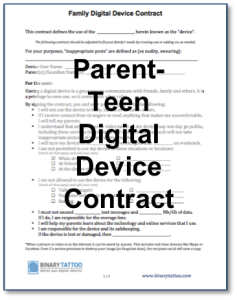When you get a new job, you sign a contract. When you rent or buy a house, you sign a contract. In fact, any time two or more parties enter into an agreement with a lot of rules, it seems like a good idea to have a contract so that everyone is on the same page. Why not then create a contract for you, your tween and their digital device?
Contracts are a great way to establish terms and resolve conflicts later. It serves to both protect your child and manage expectations of the device’s use. You can get a sample online free, including from my site, or you can make your own.
What’s in a good contract? I consulted both police and an addiction counselor to cover off areas of legal misconduct and online addiction. I coupled this with my experience having worked with thousands of students and parents. Below is the culmination of that knowledge:
For the user (the child)
Your tween or teen will be using their device to interact with friends and potentially strangers. Consider how you’d expect them to behave if they were in a public place and apply those rules here. Help them understand they are shaping their reputation online.
- Agreement from the child that their device will not be used to harass, bully or threaten others
- Agreement from the child that they will come to you if anything they find online makes them uncomfortable
- Understanding from both parties that all pictures, posts and comments online should be considered permanent, even if an application or services promises to destroy them (e.g. Snapchat)
- Parameters for the child’s use: number of texts, hours of use, places they can or can’t use the device
For the parent or guardian
When it comes to your child’s rights to privacy, every parent has a different level of comfort. It is important to establish up front what you expect to be able to do with their device. Using a digital form of communication is this generation’s version of the passed note in class. Keep in mind that some kids will find alternate ways to communicate if they feel they are being watched too closely (ie secondary accounts on networks). The best thing you can do is to ask your kids what they are using and help them understand what the risks may be with their apps.
- Agreement from the parent to respect that the device is an extension of their social life
- Agreement on what access the parent shall have to the device or password
- Agreement from both that the child will help the parent learn about their digital world
Consequences:
If the terms of a contract are broken, there should be some kind of consequence. It could be the loss of the device, less time on it, or banning of certain apps/networks. That decision is up to the family but should be included in writing as part of the contract.
An important caveat: Studies have shown that the #1 reason that kids do not tell parents about online bullying is that they fear their access to the networks will be taken away. Then they are being bullied twice – once by the perpetrator and second by the loss of use of their network. It should be clear to your child that they won’t lose their privileges if they are the victim in the situation.
Now it’s your turn. Download a sample, discuss with your family and create your own digital device contract that reflects your family’s values.


Leave a Reply